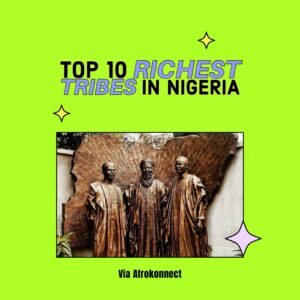Welcome to this post about the top 10 Richest Tribes in Nigeria, via Afrokonnect. With more than 300 different tribes, Nigeria is a country made up of many different cultural strands. The nation’s rich cultural legacy has produced some of the wealthiest people on the African continent, including as business titans Wale Adenuga, Femi Otedola, and Aliko Dangote, who Forbes has often listed as among Africa’s wealthiest.
Aside from these household names, countless additional high-net-worth individuals from various tribes in Nigeria have earned significant wealth, enough to transform generations. Although ethnicity does not necessarily correlate with affluence, some tribes have generated a disproportionate number of wealthy people, which has helped them establish a reputation as Nigeria’s richest tribes. The wealthiest tribes in Nigeria will be examined in this article, along with the elements that have facilitated their prosperity. The Yoruba, Igbo, and Hausa tribes—who together make up 60% of Nigeria’s population—dominate the rankings, as could be expected. Other tribes, on the other hand, have also made the list because they have renowned, wealthy people who have significantly impacted both their local communities and the country as a whole.
Top 10 Richest Tribes in Nigeria in 2025
10. Ibibio Tribe
The southern Nigerian states of Akwa Ibom and Cross River are home to the majority of the Ibibio people. They have historically used the rainforests in their region to produce palm oil, grow tuber crops, and carve wood. Many families have made a substantial living from the Ibibio tribe’s well-known talent for expert wood carving.
Rich People from Ibibio Tribe
- Godswill Akpabio: A lawyer and politician who served as Governor of Akwa Ibom State, with an estimated net worth of $550 million. Akpabio’s wealth is attributed to his successful career in politics and business.
The Ibibio tribe has a rich cultural heritage, with a history dating back to around 7000 B.C. They are known for their traditional practices, such as the Ekpo/Ekpe society, which plays a significant role in their political system. The Ibibio people have a strong commitment to preserving their cultural traditions while embracing modern economic pursuits.
9. Kanuri Tribe
The Kanuri people reside in northeastern Nigeria, across states like Kaduna, Adamawa, and Borno. Traditionally, they made a living through farming, fishing, and salt processing and trading. The Kanuri tribe has a long history of trade and commerce, with their strategic location allowing them to control trade routes between Nigeria and neighboring countries.
Rich Kanuri People and Their Net Worths
- Sani Abacha: A military general who became Nigeria’s head of state in 1993, with an estimated net worth of $10 billion. Abacha’s wealth is attributed to his successful military career and his control of Nigeria’s oil resources.
- Waziri Ibrahim: A businessman and politician who co-founded the Nigerian People’s Party. Ibrahim’s wealth is attributed to his successful business ventures and his involvement in politics.
- Baba Gana Kingibe: A diplomat, politician, and civil servant who has held high-ranking government offices. Kingibe’s wealth is attributed to his successful career in politics and diplomacy.
The Kanuri tribe has a rich cultural heritage, with a history dating back to the 8th century. They are known for their traditional practices, such as the Shuwa Arab culture, which has had a significant influence on their language, customs, and traditions.
8. Tiv Tribe
The Tiv people are located in central Nigeria, primarily in Benue, Nassarawa, Plateau, and Taraba states. They are subsistence farmers, producing crops like yams, cassava, and sweet potatoes. The Tiv tribe is known for their farming abilities, with their fertile land allowing them to produce a wide range of crops.
Richest Tiv People and their Net Worth
- Betty Abah: A journalist, novelist, and women’s rights advocate, with an estimated net worth of $10 million. Abah’s wealth is attributed to her successful career in journalism and her involvement in women’s rights activism.
- Benson Abounu: An engineer, management consultant, and politician, with an estimated net worth of $8 million. Abounu’s wealth is attributed to his successful career in engineering and politics.
- Professor Jerry Agada: A Nigerian educator and politician who served as Minister of State for Education, with an estimated net worth of $5 million. Agada’s wealth is attributed to his successful career in education and politics.
The Tiv tribe has a rich cultural heritage, with a history dating back to the 15th century. They are known for their traditional practices, such as the Tiv traditional marriage ceremony, which is an important part of their cultural identity.
7. Ijaw Tribe
The Ijaws are an ethnic group located in southern Nigeria, primarily residing in the Niger Delta region, which spans across states like Bayelsa, Delta, and Rivers. They can also be found in other states, including Ondo, Akwa Ibom, and Edo.
Historically, the Ijaw people were one of the first ethnic groups in Nigeria to have contact with Westerners, due to their proximity to the seas and oceans. This exposure led to their involvement in trade, in addition to their traditional occupations of farming and fishing. Over time, they transitioned to become merchant shippers, and later, with the discovery of oil and gas in their territory, many Ijaw people gained employment in the sector.
Despite the wealth generated from the oil and gas industry, the Ijaw homeland has struggled with poverty and neglect, with the Nigerian government facing criticism for its handling of the region’s resources.
Richest People from the Ijaw Tribe
- Ben Murray-Bruce: A business magnate, media mogul, and politician, best known as the founder of Silverbird Group. His net worth is estimated to be around $710 million.
- Goodluck Ebele Jonathan: A politician who has held various positions in government, most notably serving as the President of Nigeria from 2010 to 2015. His net worth is estimated to be around $100 million.
6. Edo Tribe
Another well-known ethnic group in southern Nigeria is the Edo tribe, which is mostly concentrated in Edo State. They are descended from one of West Africa’s oldest and most advanced empires, the Benin Empire. The Edo people were traditionally expert farmers and sculptors. Their area’s rainforest offered rich agricultural land, and their access to gold, ivory, and bronze allowed them to produce famous artwork known as Benin Bronzes. These works of art were trafficked extensively and are now found in Nigeria and other countries. The Edo people today are highly educated individuals who have achieved success in a variety of vocations, in addition to being traders and artisans.
Notable Rich Edo People
- Chief Gabriel Osawaru Igbinedion: A businessman and traditional aristocrat who holds the chieftaincy title of the Esama of the Benin Kingdom. His business empire includes a property portfolio in and outside Nigeria, as well as a private bank, oil refinery, diamond, gold, and marble mines across Africa. His net worth is estimated to be around $250 million.
- Mitchell Elegbe: An entrepreneur and businessman, best known for his role as the MD/CEO of Interswitch, an integrated payment and transaction company in Nigeria. His net worth is estimated to be around $200 million.
- Lucky Igbinedion: A politician and businessman, best known for serving as Governor of Edo State. His net worth is estimated to be around $190 million.
Top 5 Richest Tribes in Nigeria
5. Isoko Tribe
The Isoko people are located in southern Nigeria, predominantly residing in states like Delta and Bayelsa. Unlike other Nigerian tribes, the Isoko people are not particularly close-knit. However, this has not hindered their economic prosperity.
The Isoko tribe boasts a rich cultural heritage, with a history of excellence in fine arts. Over the years, they have also become known for their expertise in fishing and farming, particularly in plantain and palm oil production and distribution. Individual members of the tribe have achieved significant wealth and prosperity, although the tribe as a whole still has room for growth to become one of the richest tribes in Nigeria.
Richest Isoko People
- Benedict Peters: A businessman who founded the Aiteo Group, Nigeria’s largest indigenous oil-producing firm. His net worth is estimated to be around $2.7 billion.
- Ned Nwoko: A politician, businessman, and lawyer with diverse business interests across the world. His net worth is estimated to be around $1.2 billion.
- Jim Ovia: A businessman known for founding Zenith Bank, one of Nigeria’s most profitable banks. His net worth is estimated to be around $980 million.
4. Fulani Tribe
The Fulani people are scattered throughout West Africa, with a significant presence in northern Nigeria, particularly in states where the Hausa people also reside. Despite sharing cultural similarities with the Hausa, the Fulani are a distinct tribe with their own traditions and customs.
Historically, the Fulani were nomadic pastoralists and farmers, producing merchants, artists, and nobility. They have played a significant role in Nigerian politics, with notable Fulani leaders including Umaru Musa Yar’Adua and Muhammadu Buhari.
While the Fulani have a rich history of wealth and prosperity, many of their kin and the cities they inhabit face significant economic challenges, with widespread poverty and underdevelopment.
Rich Fulani People in Nigeria
- Olubukola Saraki: A trained medical doctor turned banker and politician, who served as Governor of Kwara State and later as Senate President. His net worth is estimated to be around $2 billion.
- Muhammadu Buhari: A retired Nigerian Army Major General turned politician, who previously served as military head of state and later as democratically elected president. His net worth is estimated to be around $110 million.
3. Igbo Tribe
The Igbo people are primarily located in southeastern Nigeria, making up a significant proportion of the population in states like Enugu, Anambra, Imo, Abia, and Ebonyi. They are also found in other states, including Rivers and Delta.
The Igbo have a reputation for being successful businessmen and traders, with a long history of excellence in commerce. The community-run apprentice scheme, known as “Igba-Boi” or “Imu-Oru,” has played a significant role in their economic success, providing young boys with the opportunity to learn a trade and eventually establish their own businesses.
Notable Wealthy Igbo People

- Arthur Eze: A businessman with major interests in the oil sector, serving as the CEO of Atlas Oranto Petroleum, the largest privately held Nigerian exploration and production group. His net worth is estimated to be around $5.7 billion.
- Cletus Ibeto: A businessman serving as the Chairman of Ibeto Group, a cement manufacturer and one of the largest auto spare parts manufacturers in Nigeria. His net worth is estimated to be around $3.8 billion.
- Innocent Chukwuma: A businessman and investor who rose to prominence by founding Innoson Vehicle Manufacturing, Nigeria’s first indigenous automobile manufacturing company. His net worth is estimated to be around $1.5 billion.
- Top 17 Richest Igbo Men and Women in Nigeria
2. Yoruba Tribe
The Yoruba people are located in southwestern Nigeria, predominantly residing in states like Ogun, Lagos, Osun, Oyo, Kwara, Ondo, and Ekiti. They can also be found in parts of Delta state, Edo state, and Kogi state.
Historically, the Yorubas were renowned for their exceptional craftsmanship, particularly in blacksmithing, leatherworking, and glassmaking. Their acceptance and embrace of Western education have enabled them to hold education in high regard, making them one of the most educated ethnic groups in Africa.
The Yoruba people have leveraged education to escape poverty and acquire wealth, making them the richest tribe in Nigeria. They occupy prominent positions in various economic sectors, including the corporate world, politics, and business. Cities like Lagos and Ibadan in the Yoruba states are among the largest and most developed in Nigeria.
Richest Yoruba People in Nigeria
- Mike Adenuga: A billionaire businessman who built his fortune in the telecommunications and oil industries. He is the CEO of Globacom and Conoil, with an estimated net worth of $7.3 billion.
- Femi Otedola: A business magnate who gained wealth through his dealings in the oil and gas sector. He has established and acquired various businesses in finance, power, and real estate, with an estimated net worth of $1.8 billion.
- Folorunsho Alakija: A businesswoman and philanthropist who serves as the executive vice-chairman of the oil exploration company Famfa Oil, with an estimated net worth of $1 billion.
1. Hausa Tribe is the Richest Tribe in Nigeria
Various states in northern Nigeria, including Sokoto, Bauchi, Borno, Kano, Katsina, Plateau, Taraba, Niger, and Adamawa, are home to the Hausa people.
In the past, the Hausa people relied on farming, trade, and manufacture for their livelihood. They gave birth to a large number of intellectuals and merchants who adopted Western education, which helped them succeed in a variety of fields, including politics. Many of the wealthiest Hausa people today have amassed their fortunes in this way.
Despite the tribe’s famous affluent members, a sizable section of the Hausa population is impoverished, and many of the Hausa-dominated region’s cities lack contemporary infrastructure.
Richest Hausa People in Nigeria and their Net Worth
- Aliko Dangote: A business magnate who has consistently ranked as the wealthiest person in Africa. He is the chairman and CEO of Dangote Group, an industrial conglomerate with interests in cement, sugar, oil, and more, with an estimated net worth of $14 billion.
- Abdul Samad Rabiu: A businessman and founder and chairman of BUA Group, a conglomerate with interests in manufacturing, infrastructure, and agriculture, with an estimated net worth of $2.5 billion.
- Theophilus Danjuma: A retired Nigerian Army Lieutenant General and politician who amassed his fortune through shipping and petroleum, with an estimated net worth of $1.6 billion.
Which Tribe is the Richest in Nigeria?
The question of which tribe is the richest in Nigeria is a complex one, with various factors to consider. While the Hausa tribe is often considered the richest, other tribes like the Yoruba and Igbo also have significant wealth and economic influence.
Factors Contributing to a Tribe’s Wealth
- Natural Resources: Tribes with an abundance of natural resources, such as oil, gas, and minerals, tend to have an economic advantage.
- Business Acumen: Tribes with a strong culture of entrepreneurship and business-oriented individuals tend to accumulate wealth.
- Education: Tribes that place a high value on education tend to have more individuals in high-paying professions and leadership positions.
- Infrastructure Development: Tribes with well-developed infrastructure, such as roads, airports, and seaports, tend to attract more investment and economic activity.
The Hausa Tribe’s Economic Influence
The Hausa tribe has produced numerous successful businesspeople and entrepreneurs, contributing to their economic influence. However, it’s essential to note that their territory lacks significant natural resources, and infrastructure development has been limited.
Other Contenders for the Richest Tribe
- Yoruba Tribe: The Yoruba tribe has a strong culture of entrepreneurship and education, with numerous successful businesspeople and professionals.
- Igbo Tribe: The Igbo tribe has a reputation for being skilled traders and entrepreneurs, with a strong presence in various economic sectors.
Conclusion about Richest Tribes in Nigeria in 2025
 In conclusion, while the Hausa tribe is often considered the richest in Nigeria, other tribes like the Yoruba and Igbo also have significant economic influence. The debate surrounding the richest tribe in Nigeria is ongoing, and various factors contribute to a tribe’s wealth. The diversity and complexity of Nigeria’s ethnic landscape have been brought to light by an analysis of the wealthiest tribes in the nation. Every tribe has distinct benefits, disadvantages, and economic strengths. Promoting economic growth, lowering inequality, and creating a more peaceful and prosperous Nigeria all depend on an understanding of these distinctions.
In conclusion, while the Hausa tribe is often considered the richest in Nigeria, other tribes like the Yoruba and Igbo also have significant economic influence. The debate surrounding the richest tribe in Nigeria is ongoing, and various factors contribute to a tribe’s wealth. The diversity and complexity of Nigeria’s ethnic landscape have been brought to light by an analysis of the wealthiest tribes in the nation. Every tribe has distinct benefits, disadvantages, and economic strengths. Promoting economic growth, lowering inequality, and creating a more peaceful and prosperous Nigeria all depend on an understanding of these distinctions.
In the end, the argument over which tribe in Nigeria is the richest should not be viewed as a contest but rather as a chance to understand and value the many cultural and economic contributions made by each tribe. Nigerian tribes may create a more promising future for everyone if they band together and use their combined strengths. Thank you for reading this post to the end, we will love to hear what you think about the post via the comment section below before you leave.
















Thanks so much for the job well done
[…] Richest Tribes in Nigeria […]